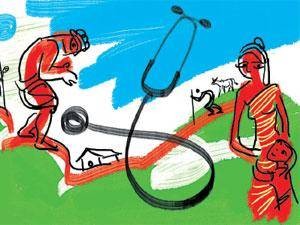representational pic
Reported by Sanjai Sharma HRLN
1. Tabassum, a 25 year old Below Poverty Line (BPL) woman from Bhim Nagar and her new born son died at Deen Dayal Upadhyay Hospital, New Delhi (DDUH) on 15 February, 2015 and 7 February, 2015 respectively.
2. On 25th February, health activists visited Tabassum’s family and community to uncover the steps that lead to this maternal death. Ultimately, the team found that Tabassum and her baby died as a result of poor implementation of government maternal health schemes, absence of ante-natal care, a broken referral system, and substandard medical treatment during delivery.
3. India accounts for the largest number of maternal deaths in the world. The latest data shows that 50,000 women died from pregnancy related causes in 2013 alone – 137 women die every day and 6 women every hour.
4. The World Health Organization reports that the 90% of maternal deaths are preventable where women have access to antenatal services, skilled delivery assistance, and post-natal care.
5. Tabassum leaves behind one surviving five-year-old child, who she delivered normally in Uttar Pradesh before moving to Delhi.
6. Tabassum registered her second pregnancy at the MCD Dispensary in Jwala Puri and had two antenatal check-ups over a period of six months.
7. During these checkups over six months she was not seen by a doctor and nothing unusual was suspected by the ANM.
8. Tabassum’s labour pains began on 6 February, 2015 at around 4 AM. She traveled to Jawala Puri MCD dispensary and a nurse at the Dispensary referred her as no doctor was present in early hours.
9. The delivery was suspected to be early, and Tabassum was bleeding, the staff could not detect fetal movement, and there was no doctor on duty at the facility.
10. An ambulance transported Tabassum to Guru Gobind Singh Hospital (GGSH). The ambulance took one hour to reach GGSH.
11. GGSH asked the family to arrange for blood, and in the meantime, referred her to Deen Dayal Upadhyay Hospital (DDUH). The GGSH staff told Tabassum’s family that the facility did not have adequate equipment required for the surgery. It took another half an hour for Tabassum to reach DDUH from GGSH.
12. Staff at DDUH asked Tabassum’s family to arrange for blood. The family arranged 8 units of blood, while the hospital supplied the rest (1 PCV). It is noteworthy to mention that in the requisition form for the blood the request was made for 2 PCV, while Tabassum was issued only 1 PCV. Petitioner No. 1, Tabassum’s mother-in-law paid 5000 Rs for medicines and her son may have paid additional sums in clear violation of the Janani Shishu Suraksha Karyakaram (JSSK) which guarantees totally free delivery services for all women at all government facilities.
13. When Tabassum was admitted at DDUH her requisition form for the blood shows a hemoglobin level at 9.8 gm%, whereas the normal hemoglobin level should be 12.3-15.3 g/dL.
14. Anemia is responsible for 17% of maternal deaths and even mild anemia should be flagged in any woman’s medical charts.
15. At DDUH, Tabassum delivered a baby boy on 6th February at 3 PM via Caesarian Section. After the delivery, the baby was immediately placed in an incubator.
16. The hospital staff did not provide Tabassum’s family any information about the health condition of the baby or about Tabassum.
17. The baby died on 7th February 2015 at 8.00 AM. The doctors did not inform the family of the cause of death. The family paid Rupees 500. To the ambulance to take the dead body of the baby.
18. Till that time, Tabassum was fine and had not shown any signs of complications. She was recovering from her surgery and was in a position to communicate with the family. After 8th February, 2015 her condition started deteriorating, but the doctors did not inform the family about her condition.
19. On 15th February, Tabassum started foaming at the mouth and sweating profusely. At the same time, her feet were freezing cold. She died at 5.15 AM the same day. The family paid for the ambulance services to remove Tabassum’s dead body.
20. From 4 AM in the morning till 3 PM, Tabassum was either travelling from one health facility to another or waiting for her treatment. Experts agree that three delays lead to maternal deaths: a delay in seeking delivery care, a delay in reaching facilities, and a delay in receiving adequate care at facilities. Here, Tabassum experienced two delays, contributing to her death at age 25.
21. From 06.02.15 to 15.02.15 Tabassum’s family stayed by her side at the hospital and lost their meager daily wages. They spent around Rupees 10000 on her medicines, travelling, and cremation. Health activists went with Petitioner No. 1 to obtain Tabassum’s medical records, but the hospital refused.
22. On hearing a petition filed by Tabassum’s mother in law in Delhi High Court Hon’ble Mr.Justice Rajiv Shakedhar told the NCT of Delhi Lawyers “ You have schemes,you have a court order, the woman died and her child died in your hospital, “this is gross”.
23. He ordered that the NCT of Delhi will produce a social audit of all hospitals coming under its jurisdiction on the next date of hearing.

Leave a Reply